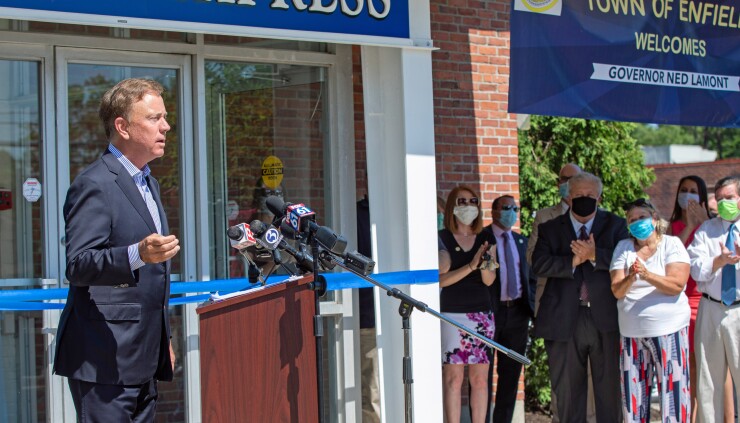Amid projections of a year-end $153 million state budget shortfall for fiscal 2020 due to COVID-19, Connecticut’s State Bond Commission on Tuesday approved borrowing for roughly $550 million of projects.
The list of projects, large and small includes $111.6 million in special tax obligation bonds primarily for road and bridge repair. Other spending will cover capital projects for new schools, hospitals, Internet technology and community policing.

“Some of these crises of yesterday don’t go away just because we had a COVID crisis,” said Gov. Ned Lamont, the commission's chairman, said at the special meeting. "We still have a lot of ongoing commitments."
The panel also approved a request from state Treasurer Shawn Wooden for $800 million in general obligation bonds.
State Rep. Christopher Davis, R-Ellington, the ranking member of the state legislature's finance, revenue and bonding committee, suggested the borrowing is excessive while Connecticut's revenues to continue to decline.
"Things are changing quite rapidly and regularly, it would appear," Davis said. "I do believe that some of the items on this agenda perhaps are not necessary at this time when the state is facing this fiscal peril."
In a
By law, the state’s budget reserve, or rainy-fund, must cover shortfalls.
According to McCaw, that will leave Connecticut with a rainy-day balance of $2.67 billion, or 13.3% of net general fund appropriations for the fiscal year that began July 1. Connecticut operates on a biennial budget.
Moody’s Investors Service rates Connecticut GOs A1, while S&P Global Ratings rates them A. Fitch Ratings and Kroll Bond Rating Agency rate them A-plus and AA-minus, respectively.
Lawmakers returned to the capitol in Hartford this week for a special session to take up police accountability and election matters.
The state’s Special Transportation Fund, McCaw added, will end the year with a $142.2 million operating deficit, with the fund’s balance at $177.9 million as of June 30. The fund, backstopped by fuel taxes and various fees, pays for debt service on transportation bonding and the operating costs of the Department of Transportation and Department of Motor Vehicles.
Connecticut’s transportation agencies, like peer organizations nationally, have been balancing vital service needs while revenue has fallen sharply after the pandemic escalated.

“The situation in Connecticut is reflective of what we’re seeing more broadly. Transit’s in trouble everywhere,” said Melissa Kaplan-Macey, vice president for state programs and Connecticut director for New York-based think tank Regional Plan Association.
Even before the coronavirus pandemic, transportation was a hot-button statewide, with topics that ranged from congestion to highway tolling to inner-city mass transit.
“We need to be purposeful about what we intend to achieve with transportation funding,” Norman Garrick, a professor at the University of Connecticut’s School of Engineering, said Tuesday at an online forum sponsored by RPA and AAA Northeast.
Inadequate transportation funding, Garrick said, has triggered the downfall of the state’s largest cities, Bridgeport, New Haven and Hartford. “We have allowed the state to become suburbanized.”
Richard Andreski, bureau chief for public transportation at the Connecticut Department of Transportation, said. while rail service commands much attention and media headlines, the split between rail and bus passengers throughout the state is about 50-50.
“With rail, the office workers — Stamford, New York City — have all but disappeared during the pandemic,” Andreski said of the work-at-home dynamic.
“On buses we have 42 million riders, and many of them must be present. Their jobs don’t translate well to telework.” Other bus passengers, he said, are making personal rounds such as medical appointments, grocery shopping or visiting family.





